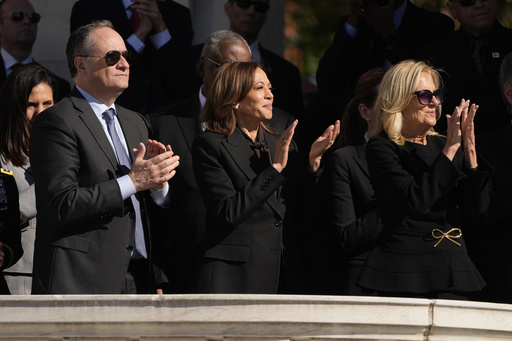
NEW YORK — The leadership of Kamala Harris’ campaign for the presidency asserts that the limited timeframe available severely constrained their ability to develop an effective strategy against Donald Trump. They expressed that the “ferocious” political barriers they faced during the 107 days following President Joe Biden’s departure significantly impacted their campaign.
Hitting back on the “Pod Save America” podcast, which was released on Tuesday, Harris’ team provided insights into their decision-making during the final phases of the campaign. These choices have faced criticism in the aftermath of Trump’s convincing electoral triumph. The team justified Harris’ attempt to connect with Republican voters, her decision to maintain close ties with Biden, her lack of response to Trump’s criticisms regarding her transgender policies, and the unsuccessful effort to arrange an interview with well-known podcaster Joe Rogan.
“When you’re in a 107-day race, it becomes incredibly challenging to accomplish what you would typically do in a one-and-a-half to two-year timeframe,” remarked Jen O’Malley Dillon, a senior adviser to Harris. David Plouffe, another senior adviser, interjected, “There was a cost associated with such a brief campaign.”
These candid evaluations of Harris’ campaign losses occurred just before she was set to engage in a conference call with supporters, as the party embarks on a difficult journey of introspection. Trump convincingly captured every contested state while making inroads with critical voter demographics, including young people and voters of color, who have historically favored the Democrats.
Harris’ team did not contest the validity of Trump’s win, with O’Malley Dillon declaring, “We lost.” However, there was no acknowledgment of any missteps during the extensive podcast discussion. Instead, the advisers pointed out the limited options Harris faced due to the compressed campaign timeline and the formidable anti-incumbent climate threatening officials worldwide.
They also recognized the effectiveness of Trump’s campaign efforts. Specifically, they cited one of Trump’s final attack ads that called attention to Harris’ endorsement of funding for sex reassignment surgeries for transgender inmates. “Clearly, it was a very impactful advertisement in the closing stretch,” noted Quentin Fulks, Harris’ deputy campaign manager, who believed it made her appear disconnected.
Although the campaign explored various potential responses to the ad, they ultimately opted against a specific rebuttal. “There are no simple solutions to this,” concluded O’Malley Dillon. Plouffe further commented on the potency of Trump’s attack ad about “Bidenomics,” admitting that the transgender-related attacks were detrimental. “She was on record,” he stated, underscoring that managing surgeries for transgender individuals in prison was part of the Biden-Harris agenda during the 2020 election.
Addressing ongoing inquiries regarding their media strategy, Harris’ campaign confirmed her genuine interest in appearing on Joe Rogan’s podcast, a platform frequented by millions and that ultimately endorsed Trump. Senior adviser Stephanie Cutter explained that scheduling conflicts prevented the appearance. “We had talks with Joe Rogan’s team, and they were very accommodating. We were keen to join,” she said. “Will she be on it in the future? It’s possible, but it didn’t ultimately change the result.” Plouffe noted that the team had even proposed to do the Rogan episode while on location in Austin, Texas, but Trump managed to secure an in-studio interview with Rogan.
Additionally, Harris’ campaign stood by her strategy of appealing to moderate Republicans towards the campaign’s end, a move that has drawn criticism from some progressives who feel that more effort should have gone into mobilizing traditional Democratic supporters. “The political climate was extremely challenging, to say the least. We were contending with fierce resistance,” Plouffe articulated. He admitted that a noticeable shift toward Trump was present among non-college-educated voters, particularly those of color, making outreach to moderate voters a priority. “While maximizing turnout among liberal voters is crucial for a Democrat, which was our main objective, it’s equally essential to command the middle ground,” he explained, asserting the need to win strongly in that voter segment.
